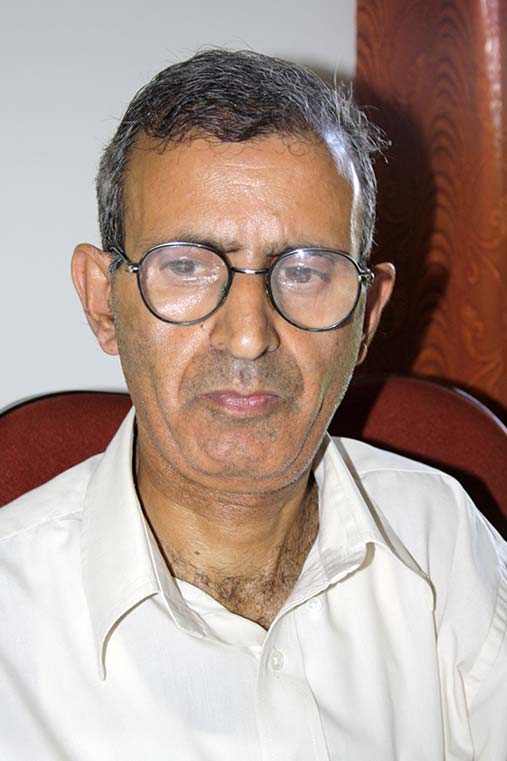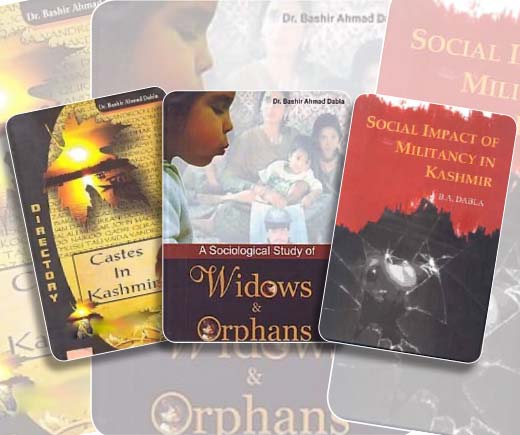No one understands Kashmiri society like Dr Bashir Ahmad Dabla. Despite suffering from Parkinson’s disease for last 15 years, the professor refuses to give up. Syed Asma profiles the man and his struggle

Dr Bashir Ahmed Dabla’s work is worth admiring! He celebrated his sixtieth birthday this year. Sixty, an age set to get retired from any institution but his enthusiasm and commitment towards work compelled the university authorities to give him an extension of two more years.
What makes his story more inspiring and worth admiring is the way he is living his life. Fifteen years ago Dr Dabla was diagnosed with Parkinson’s disease. This did not affect his life in anyway, he says, as he continued to work at the same pace.
He remembers when he was in Mangalore where after presenting one of his papers he went for site seeing to a nearby beach. The cold waves around disturbed him a bit and he felt dizzy. He came home after the conference concluded but was a bit curious about the dizziness symptom.
“I wanted to go for a general medical investigation to know why it happened,” remembers Dabla. Wanting to end his curiosity he visited many health centres from Delhi to Europe and finally in Birmingham he was diagnosed with Parkinson’s. Being young and passionate about his work, the diagnosis did not affect him in anyway. He, almost every year, comes up with a book and a research paper. So far he has published dozens of books, hundreds of papers and has visited six of seven continents in the world.
“Only Australia is left now,” says Dabla with a smile.
“When I was diagnosed with this disease I was quite young. It didn’t change anything apart from an addition of a mild drug dose in my schedule. But today things are a bit complicated.”
Parkinson’s disease is a degenerative disorder of central nervous system. The person diagnosed with the degenerative illness has to brave a couple of odds including irregular body shakes, body rigidity, slowness of movement, difficulty with walking and dementia.
Dabla in the past decade has defied all these weakness and has contributed to the sociological archives. He is always seen busy with books – either reading them or writing some of his own, says his acquaintances. Being a sociologist, he has extensively studied the society of Kashmir. His works acts as a ‘wikipedia window’ into Kashmiri society. He has analysed a Kashmiri child, men, woman, family structure, domestic violence, labour exploitation, conflict from a larger theme of occupation.
Serving the department as a head for twenty years, he believes, every subject, especially social sciences, should be taught in the local context. “If I am offering a master’s program in Sociology in University of Kashmir, it is important for the students to understand broader sociological theories through the prism of their local society. It gives them a better understanding,” says Dr Dabla.
A thin man, wearing simple attire, Prof Dabla is a soft spoken person. Everyone in the department, from a helper to his colleagues respect and describe him as an inspiring figure. “He is always into books,” says one of his research scholars.
Born in Nowhatta, Srinagar Prof Dabla after doing his graduation moved to Delhi. He spent seven years doing his masters, M.Phil and PhD from Jawaharlal Nehru University (JNU) and became first Kashmiri Muslim to earn a doctorate in Sociology.

He owes his commitment towards his work to the seven years he spent in JNU. “As I was the first Muslim Kashmiri to earn a PhD in Sociology I thought I would be welcomed back home, but that wasn’t the case,” says Dabla. He was jobless for a good amount of time which compelled him to visit the then Chief Minister (CM), Farooq Abdullah.
Dabla remembers, he [Farooq Abdullah] was quite impressed by my qualification and told me to join the gang of his press officers which included Raja Muzzafar from University of Jammu and Farooq Nazki, a poet. In the meantime he was also appointed as an assistant director social welfare but continued to be the press officer at CM’s office.
As a press officer Dabla handled foreign correspondents who would come to interview Farooq. Besides he would write his press release and speeches.
Dr Dabla remembers Farooq as a practical person but a non-serious politician. He used to solve problems of commoners giving practical solutions but never took his political career seriously.
Dabla has a few interesting anecdotes.
Once some villagers visited former Chief Minister [Farooq Abdullah] with a plea that Army is eyeing a large piece of land in their area but they [villagers] are reluctant to surrender. Instead of consulting the Army officer, Farooq came up with an innovative idea. “Unload few truck loads of bricks inside that ground and erect a board reading ‘Makhbar-i-ahli-Islam’. I am sure you will be saved,” laughs out Dabla, “and his idea worked.”
But, Dabla opines, the non-serious attitude of Farooq towards his political career led Ghulam Mohammed Shah to topple his government.
He remembers, few days before the government was toppled, a French reporter had informed Farooq that Indira Gandhi is planning to use Shah against him, but he did not do anything. “I believe he could have easily saved the regime then.”
After the government was toppled, Shah’s men transferred Dabla to far off Gool Gulabgadh area in Ramban district. “A career in the department of Social welfare never impressed me. I always wanted to become an academician. So, I moved to Aligarh Muslim University and got a job as Assistant Professor.”
After spending five long years working with the Indian Muslims Dabla got an opportunity to start department of Sociology at the University of Kashmir. It was Farooq Abdullah who recommended Dabla’s name to the then Vice Chancellor, Musheer-ul-Haq.
Haq, Dabla believes, was a man with strong credentials who rarely worked to please the political figure. He [Haq] was the man of principles and a good administrator.
Working at home is always good, believes Dabla. “I had an offer from one of the universities of Africa but I preferred to work in Kashmir.”
Dabla joined University of Kashmir in 1989 – the year when armed militancy challenging India’s rule started in Kashmir. Hazratbal and the adjoining areas were scarcely populated then and thus used to be den for militants.
“I am not against armed resistance but it was hurtful when a few youngsters used it for their petty issues.”
Dabla remembers instances where district commanders used their positions and guns to leak examination papers or to pass their semester examinations.
“I once had disqualified a girl who happened to be sister of a commander of some little known organisation. He came into my room putting gun on my head. Sometimes we did compromise but at times we successfully fought,” recalls Dr Dabla.
After talking to Kashmir Life for an hour he gets back into the pool of pages scattered on his table. These pages would soon be compiled into a book, he concludes.
















I take pride being Dr Dabla’s student.he is the only acclaimed and renowned sociologist of the Valley.
ADFAR Shah
Sp.Corrospondent
EURASIA Review
US